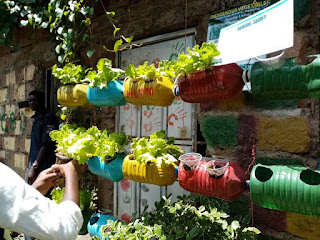Slum youths are embracing urban agriculture, creating food security for thousands of city dwellers
 |
| Pics courtesy |
Figures from the census 2019 released by the Kenya National Bureau of Statistics (KNBS) reveal that Nairobi's total population stands at 4, 397,073. One of the sub counties in Nairobi, Njiru sub county, is the third most densely populated area with atleast 630,000 residents. Njiru sub county covers Kayole, Ruai, Njiru, Matopeni, Soweto and Kamulu slums.
With this big population, area residents have to compete with inadequate social amenities and are faced by social ills hence pilling pressure on the government and organizations to provide interventions such as quality healthcare, education, good sewerage systems and enough safe food.
The area is notorious for armed robbers, criminal gangs, land grabbing cartels, cybercriminals and petty offenders. But this has not stopped these group of young men and women of Mwengenye Lifestyle to chart a brighter path.
This Community Based Organization based in Njiru is on a mission to create a sustainable farm that connects its community with the environment through fresh local produce, education and economic empowerment by implementing its urban agriculture initiative.Urban farming refers to any agricultural activity that occurs within and sorrounding the boundaries of cities.
"As affected youth, we realised that some of these challenges could easily be dealt with using the right interventions. We formed the group and embarked on sensitising and mobilising our friends on the importance of coming together to overcome our challenges to give us a voice to call for support in dealing with these challenges," says Geoffrey Ngugi the group secretary.
Land utilization, waste management
Their Nairobi Urban Agriculture Project (NUAP) whose focus is producing quality food in controlled environments and for purposes of land utilization and waste management is providing an important food and income source for low-and middle -income city residents.
They have two demo plots which they have rented each measuring 40 by 60 feet. Here, they utilize all available spaces including vertical spaces, roof tops and balcony plant installations. They've planted farm plants inside old plastic bottles and vehicle tyres. "Our aim is to raise the food and nutritional security levels in Kenya and improve livelihoods for urban families through upgrading normal subsistence urban agriculture into a major driving force in poverty alleviation, employment and wealth creation and achieving zero hunger,"says Geoffrey.
Geoffrey and his 50 group members believe that due to the limited space available for farming in urban towns, urban and peri-urban agriculture requires innovative farming technologies to maximize production per unit area.
"With proper technology, farming can be done anywhere. You can do it through
green house farming, micro-gardening, hanging and backyard gardens, multi-storey gardens, community gardening in vacant plots and parks , kitchen gardens,roadside urban fringe agriculture, sacks and container gardening as well as hydroponic and aquaponics farming.
Social inclusion and training program
Every Saturday, the group opens its doors to offer its inhabitants and other guests an access to their demonstration farm. Among them groups of school going children accompanied by their teachers who come to learn about new farming techniques.
Apart from offering training, the members get contracts to install urban agriculture structures in homes and schools and also sell fresh vegetables grown in their demo farm. These activities have created job opportunities for the 50 unemployed youth and provided a safe haven to avoid falling into crime.
The group is participating in the Rockefeller Food Systems Vision awards that honor organizations focused on urban agriculture.
It is estimated that by 2050, 68% of the world population will live in urban areas. This intensification of the urban population presents a major challenge to the sustainability of the cities’ food supply system and Mwengenye group is doing its part to achieve that.







Comments
Post a Comment